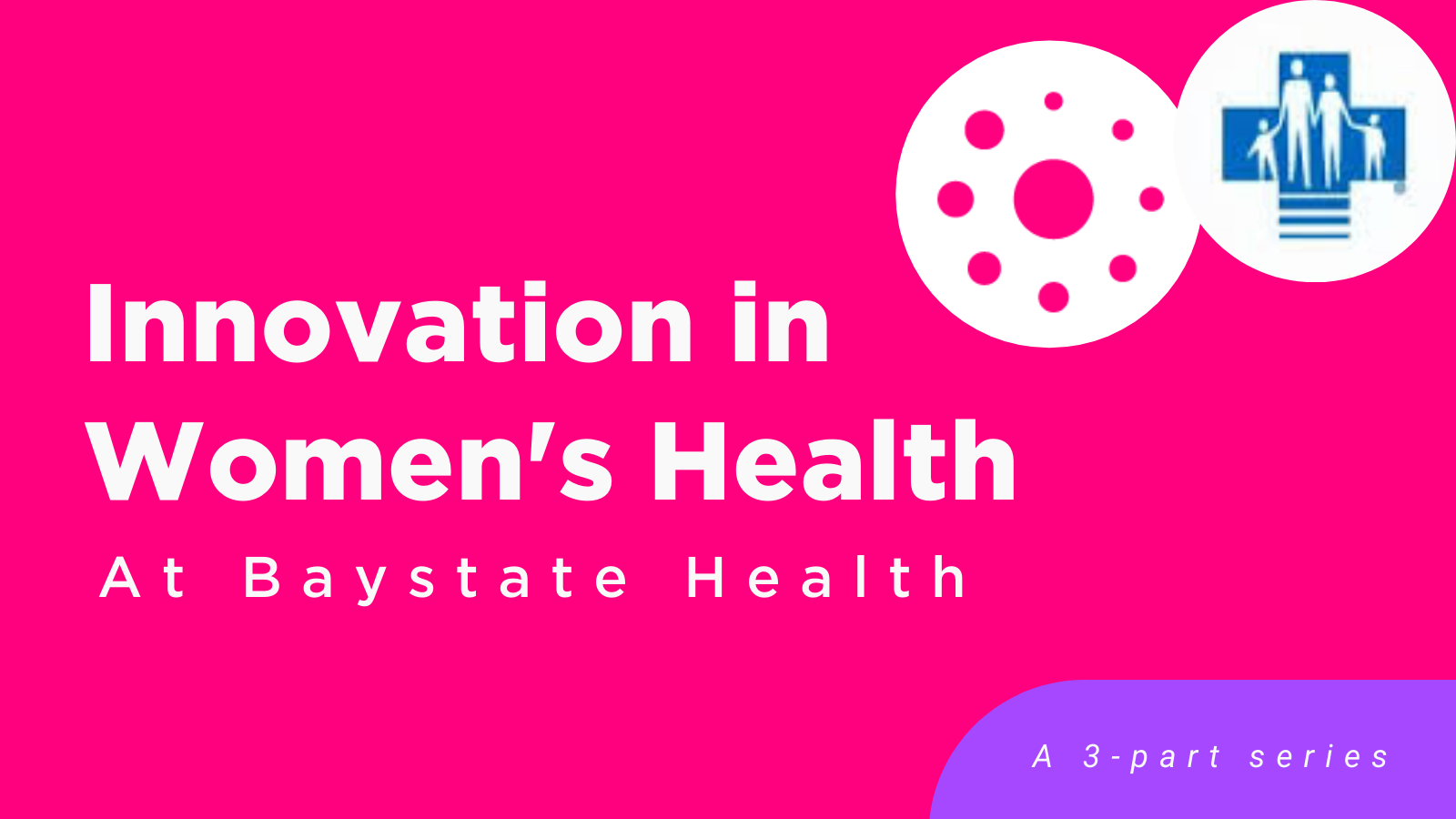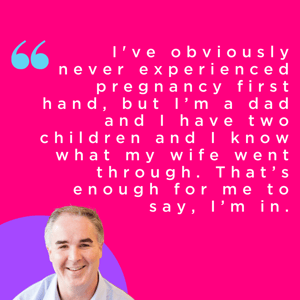
This month, Babyscripts sat down with our partners at Baystate Health to talk about innovation in women’s health.
Kathaleen Barker, MD, Asst. Professor of Obstetrics and Gynecology at University of Massachusetts Medical School - Baystate, and Joe Diver, Director of Digital Transformation at Baystate Health, discussed why they’re planning to streamline the delivery of digital health tools through integration, how funding from unexpected sources made a critical difference in Baystate’s deployment of virtual tools, and why their pilot with Babyscripts is just the beginning of their plans to transform the women’s health service line.
[Listen to the full recording]
A unique approach to innovation.
Techspring (Baystate’s innovation arm) has developed an innovation model that is leveraged within Baystate, wherein all of the key leadership across the organization bring “passionate problems” into the TechSpring model and look for a transformative solution — it’s called “match-making”. The team at Techspring takes the proposed solution through an intake process, honing and evaluating the solution so that it can be scaled appropriately.
Three separate but related events over the past year inspired them to use this model to drill deeper into solutions for Women’s Health.
Baystate very quickly shifted to telehealth across the board in response to the Covid pandemic, focusing on how that could be done safely, particularly for pregnant mothers. At the same time, they focused on how they could better manage women who are affected by hypertensive disorders of pregnancy — as a tertiary care regional referral center, Baystate Medical Center sees a much higher percentage than the average quoted in the literature (closer 20% vs. 8-12%). Lastly, Baystate renewed their focus and commitment to reducing racism and addressing bias, evaluating how to affect meaningful change across the system.
Finding a low cost solution.
Baystate ran into difficulty getting blood pressure cuffs, an essential part of the strategy for safely monitoring their pregnant population outside of the clinic. Patients could use their own scales to check their weight, obtain fetal monitors with no difficulty, but obtaining BP cuffs — and getting them covered by insurance — was a much greater challenge.
With the pandemic putting a massive financial strain on the hospital system, they looked for a low cost solution for remotely monitoring their pregnant population. They found Babyscripts.
We recognized that Babyscripts is a great solution for most places where it can be reimbursed. Unfortunately, MassMedicaid doesn’t reimburse for it. So we had to get creative — we found this product that met all of our goals and overcame our challenges, but we needed help funding it. - Dr. Barker
That’s where TechSpring came in.
Funding virtual care.
One of the great things about Covid is that it’s helped our organizations really rethink virtual care. And it opened the ability to apply for grant funding. The FCC came through for us with the CARES Act. - Joe Diver
 Baystate and TechSpring used a small part of the FCC grant to implement the Babyscripts solution at two practices, and monitor providers and care teams in the use of the tools. They ran the solution through their intake model, asked if it was appropriate to scale, and the provider organization said “Yes.” And then they invested in an additional 6 months of “experimentation” (as it’s called on the intake model).
Baystate and TechSpring used a small part of the FCC grant to implement the Babyscripts solution at two practices, and monitor providers and care teams in the use of the tools. They ran the solution through their intake model, asked if it was appropriate to scale, and the provider organization said “Yes.” And then they invested in an additional 6 months of “experimentation” (as it’s called on the intake model).
In the second half of the experiment, the team at TechSpring reached out to the Amelia Peabody Foundation, a non-profit focused on educating young adults from economically distressed areas who need additional assistance. They received an additional grant from them — the first time that APF had ever invested in healthcare IT. These grants helped Baystate get over the financial barriers to virtual tools since they weren’t being reimbursed.
Because we were able to pilot this and show how it’s been successful in our workflow, it’s made getting additional funding much easier. Starting an initiative like this in a large health system can be so challenging and cumbersome that sometimes it doesn’t happen, so I’m grateful for all the teams that were willing to start with a small group of people and learn the value and then expand. -Joe Diver
Additional funding from the APF, which is incredibly excited to see the impact of Babyscripts on the community, is now going to help Baystate expand the postpartum hypertension monitoring offering to all patients who deliver at Baystate Health and need postpartum monitoring.
Piloting Babyscripts.
Together with one of my midwifery colleagues, we considered the end goal. What did we want to do with Babyscripts? Ultimately, get blood pressure readings into the hands of our patients. But we also wanted to see how it affected a low risk group and a high risk group. - Dr. Barker
The pilot leads split the pilot into two arms, implementing Babyscripts at two practice locations — a low-risk group at a midwifery practice and a group identified as high risk for hypertension at a physician location. They enrolled all patients onto the Babyscripts app for digital education and remote monitoring for prenatal blood pressure monitoring. Patients with hypertension were enrolled in postpartum hypertension monitoring.
Because it was a pilot and funding was tied to a tight timeline, they decided to delay integration with the medical record.
I’d like to give a huge shout out to the Babyscripts implementation team here. We came to this with urgency, first to get cuffs into the hands of our pregnant patients, but also some financial urgency, as our funding came with a pretty tight timeline. We implemented Babyscripts in about 6 weeks.
Immediate impact.
Baystate found that the exception-based workflow was a major value-add for the practice. One of the biggest hurdles they anticipated was providers, nurses, office staff feeling like they had yet another system to check or process to complete in an already overburdened and taxed system.
The peace of mind that comes with Babyscripts workflow is tremendous. If my patients have a BP that’s outside of the normal range, I know that information will come to me, whether I’m tracking them in the platform or not. - Dr. Barker
This is part one of a three part series. Part 2 will highlight patient stories and impact. In Part 3, we get a sneak peek at Baystate's future plans for Babyscripts, including integration into the medical record and a joint deployment with Health New England.

Submit a comment